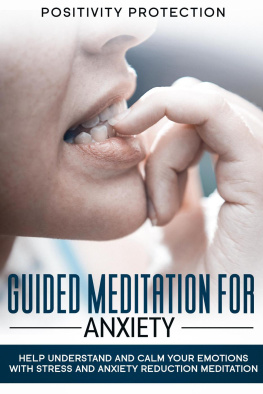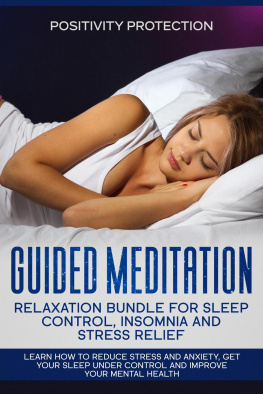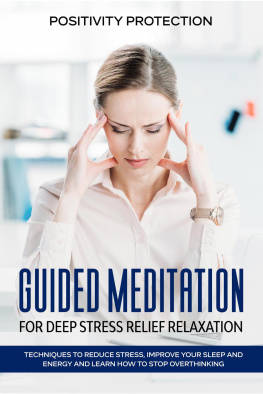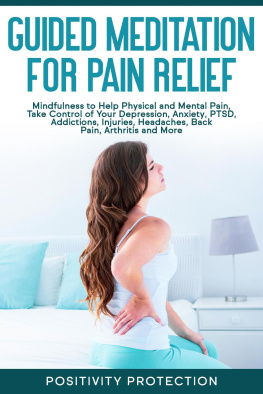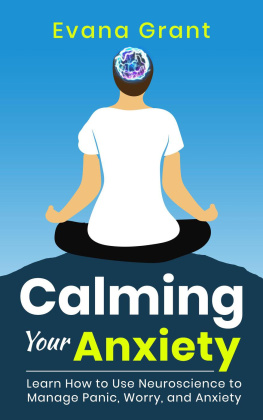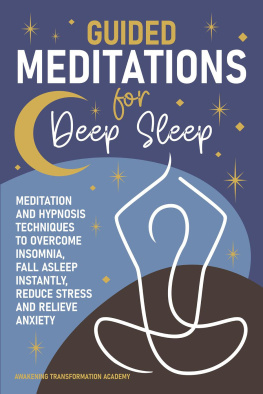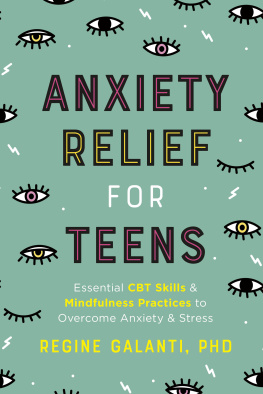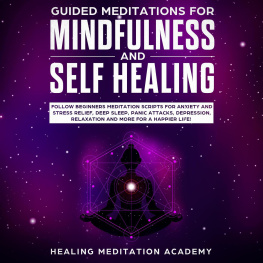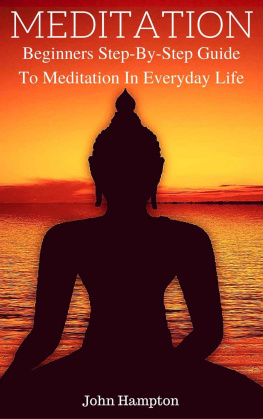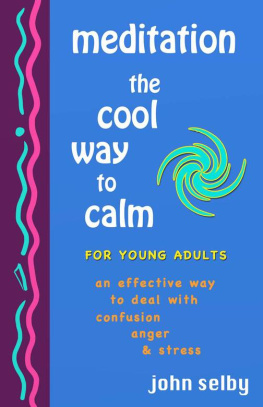Guided Meditations for Anxiety
Help Understand and Calm Your Emotions with Stress and Anxiety Reduction Meditation
Positivity Protection
Copyright 2019 by Positivity Protection - All rights reserved.
This content is provided with the sole purpose of providing relevant information on a specific topic for which every reasonable effort has been made to ensure that it is both accurate and reasonable. Nevertheless, by purchasing this content you consent to the fact that the author, as well as the publisher, are in no way experts on the topics contained herein, regardless of any claims as such that may be made within. As such, any suggestions or recommendations that are made within are done so purely for entertainment value. It is recommended that you always consult a professional prior to undertaking any of the advice or techniques discussed within.
This is a legally binding declaration that is considered both valid and fair by both the Committee of Publishers Association and the American Bar Association and should be considered as legally binding within the United States.
The reproduction, transmission, and duplication of any of the content found herein, including any specific or extended information will be done as an illegal act regardless of the end form the information ultimately takes. This includes copied versions of the work both physical, digital and audio unless express consent of the Publisher is provided beforehand. Any additional rights reserved.
Furthermore, the information that can be found within the pages described forthwith shall be considered both accurate and truthful when it comes to the recounting of facts. As such, any use, correct or incorrect, of the provided information will render the Publisher free of responsibility as to the actions taken outside of their direct purview. Regardless, there are zero scenarios where the original author or the Publisher can be deemed liable in any fashion for any damages or hardships that may result from any of the information discussed herein.
Additionally, the information in the following pages is intended only for informational purposes and should thus be thought of as universal. As befitting its nature, it is presented without assurance regarding its prolonged validity or interim quality. Trademarks that are mentioned are done without written consent and can in no way be considered an endorsement from the trademark holder.
Table of Contents
T he power of meditation and its psycho-spiritual partner, mindfulness, cannot be overstated: in the current century, no singular movement has captivated the imagination and soothed the souls of so many. Turning away from the hard-driven ambitions and self-effacing habits ingrained in previous generations, we are currently more interested in becomingand raisingcalmer, more compassionate, and less anxious human beings. The practice of meditation and the discipline of mindfulness serve to ground us physically and emotionally while attuning our focus to the present moment.
Meditation and mindfulness are often used interchangeably, and there is nothing inherently wrong with thatthey both come out of the same Eastern traditions (Buddhism as the primary, though not sole, influence) and have as their goals similar ideas. It could be said that meditation is the overarching term for a set of practices, including mindfulness, that work to center our spirits and soothe our souls. Meditation is largely a learned technique that involves stillness, focused breathing, and a finite moment of time; there are many different variations on this theme, but at its most basic, meditation is taking a set period of time, from five minutes to ten times that (for the expert practitioner), to focus on the breath and detach the mind from active thought, including judgment and other negative emotions. Mindfulness, on the other hand, is a habit that can be practiced all of the time at any given moment, a habit of awareness of what is going on around you in the present moment, again free of value judgments. These two sides of the same coin nurture and support each other: being mindful enriches your meditative experience, while meditation expands your mindful attention. As Ed and Deb Shapiro of Thrive Global writes, mindfulness is the awareness of some-thing, while meditation is the awareness of no-thing. That is, mindfulness draws your attention to all the things in your present moment, while meditation allows your conscious thought to drift away from all those things into a higher state of non-self-directed awareness.
Both meditation and mindfulness are practiced for a variety of reasons, chief among them the cultivation of calmness, the absenting of anxiety, and the disentangling from the negative thoughts and emotions that keep us stuck in particular kinds of thinking or behavior that lead to strife and/or unhappiness. The benefits to us are obvious and many: these practices can lead to enhanced ability to focus, developing higher self-esteem, fostering greater compassion and empathy, and, ultimately, increasing a sense of happiness. It can also help us deal with negative emotions (fear, anger) or events in positive ways. In terms of aiding in sleep, these practices also promote the ability to relax and to calm the mind. Thus, more people are using these techniquesparticularly guided meditationsto improve their sleep and overall well-being.
Guided meditation is essentially a kind of meditation wherein you follow someone elses soothing words, images, and tone. For beginning meditators, guided meditations allow us the ability to fully immerse ourselves in meditation without having to worry about the individual effort as much: you can relax to the guided images and sounds of a practiced practitioner of mindfulness and meditation. Guided meditations are excellent for those who may have survived trauma and need assistance achieving the kind of calm, relaxed, and anxiety-free state for which we all strive. This is also true of those of us who have trouble falling to sleep: guided meditation can give us an entryway into an untroubled mind that readily welcomes sleep. Choose which meditation seems right for your present moment, whether your body is tense and painful or your mind is distracted or overwhelmed by anxiety and difficult emotions, then ease into however you feel most comfortable; after all, this is your meditation practice, regardless of the guide. This book offers a number of meditations designed to help ease anxiety that keeps the body tense and the mind racing. Use them all to work toward achieving awareness and letting go of anxiety. These guided meditations also serve as the groundwork for developing your own sense of how to meditate: really, the basics of the meditative practice are simple and straightforward. Set aside enough time without distraction to start; begin to turn the mind to the present as it is; learn to let go of judgment and foster acceptance; and be kind to your mind when it wanders, bringing it gently back into focus. These guided meditations give you a platform on which to build your own ability to cultivate mindfulness and gratitude.
Once we have attained a greater sense of self-awareness, we become more mindful of how we affect others and how we allow them to affect us. We become more mindful of what we control and what we do not control. We become more mindful of our surroundings, our actions, andmost importantlyour potential. This kind of mindfulness requires upkeep, as do all practices that profoundly impact our habits, and practicing meditation can be a scheduled activity, one that you plan for and practice each day in order to cultivate awareness and calm the emotions. Mindfulness, in addition, offers the opportunity to remember that remaining in the present moment and noticing all the good that life has to offer at every turn creates gratitude and peacefulness.
Next page
